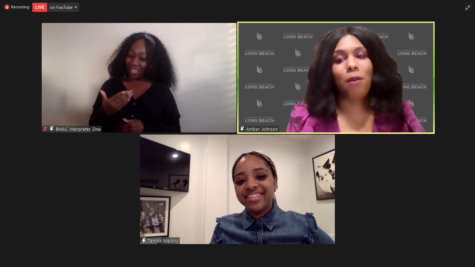Social justice leader Tamika D. Mallory spoke on her leadership experience and activism during the first segment of the Voices for Justice: Equity & Arts Series on Feb. 24 at Long Beach State.
The event was hosted online by the Richard and Karen Carpenter Performing Arts Center, in partnership with CSULB Division of Student Affairs and Diversity, Equity and Inclusion for Academic Affairs.

Amber Johnson, an assistant professor in the Department of Health Science, hosted the discussion where Mallory opened up on her early experience with community engagement as a result of her parents’ guidance. It was through her parent’s diligence every weekend that she learned the importance of upliftment within the Black community.
Now, 25 years later, she has grown a massive following for her leadership and activism.
“25 years ago I was doing it because my parents said so,” Mallory said. “But as I’ve gotten older, and have experienced my own trauma and life in general, and also have had a more keen understanding of what’s happening in the world, I began to take on the movement for myself.”
Mallory is the co-founder of Until Freedom, an organization that has made it its mission to advocate for social justice for the Black community, and the co-chair of the 2017 Women’s March.
“I think that over 25 years, I’ve gone from being influenced by others and into a place where I actually own this work,” Mallory said.
During their discussion, Johnson asked Malllory if she believed George Floyd’s death was different from others seen in the past. Mallory said that there certainly was no difference, bringing up Eric Garner died after a police officer put him in a chokehold during arrest.
However, Mallory says that due to the coronavirus pandemic, the emotional pain and discomfort these deaths caused were exacerbated by the fact that people were stuck at home.
“There was nowhere to run, there was nobody to talk to, to talk yourself out of being upset, there was no job to go to that you were moving so quick that you could forget, you’re literally sitting with this killing in your hand on your TV, and there was nothing you could do about it,” Mallory said.
The proximity of time between the deaths of Breonna Taylor, Ahmaud Arbery and George Floyd contributed to a burst of action from activists calling for the fair and equal treatment of the Black community.
“I think there was a sensitivity and openness of one’s heart that is very different from times of the past, because the pandemic made us one people,” Mallory said.
The next Voices for Justice: Equity & Arts series segment will feature Benjamin Crump, civil rights lawyer. The date and time for the event is yet to be announced.




